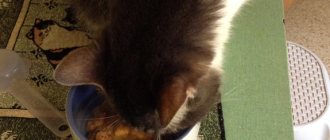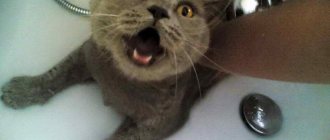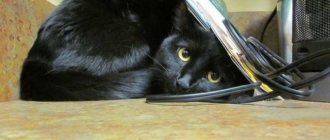Videos of cats who are afraid of cucumbers have recently flooded the Internet. In them, animals look to the side, and their owners secretly place a vegetable behind them. When cats turn around, they are startled by an object that was not there before, often jumping back and up.
Source: kulturologia.ru
While both the video and the cats' reactions shock and amuse people, the question remains as to why pets are afraid of cucumbers.
Where does the idea that cats are afraid of cucumbers come from?
In the summer of 2015, with the help of a video posted on the website of one of the popular publications, a cat’s fear of green vegetables was clearly demonstrated to the world for the first time. And although such an experiment is hardly humane, many people began to repeat the same trick with their four-legged pets. In this case, people see the reaction of cats as extremely funny and do not think about the reason for such fear, about what the cat himself is experiencing at this time.
Video: cats' reaction to cucumbers
The joke about a cat's reaction to a cucumber is that when the animal eats, it doesn't feel threatened. He is surrounded by familiar objects, delicious food, and a master whom he loves. The cat does not expect a trick and experiences real panic when suddenly a long green object appears from behind him from nowhere. The cat panics.
Seeing a cucumber near him while eating, the cat jumps out of fear and surprise
Causes of fear
Veterinarians, cat breeders and other “cat” experts have identified several reasons why a cat experiences fear when an ordinary cucumber appears in its field of vision.
Cucumber is a new item for the cat
Cats are usually suspicious in order to be able to quickly protect themselves in case of danger. This is the main reason for their fear of cucumber. The animal's violent reaction to this object suggests that cats do not like the effect of surprise.
They are used to being in control of everything that happens around them. The problem of a cat's fear, in essence, does not lie in the cucumber itself; it is broader in scale, since the animal is afraid not so much of this vegetable as of all other unknown objects that suddenly appear on its territory.
The cat is frightened by new objects and is wary of them.
Some curious cat owners decided to check how their pets react to other oblong objects. The animals were given curling irons, zucchini, and bananas. If they appeared in the cat’s field of vision suddenly, like a cucumber, then the result was the same: the animal was afraid of them.
The cat considers the cucumber a threat
The fear associated with the appearance of a cucumber is not a phobia, it is an adequate reaction of the body (an existing instinct) in response to sudden external stimuli, a possible threat or danger.
This reaction of the animal is called the start reflex, during which the cat jumps away, and from there it evaluates the current situation and the likelihood of a threat. A simple cucumber may look like a snake or other natural threat to an animal.
The cat considers the cucumber a threat
While eating, the animal's vigilance is weakened
The place where the cat eats is considered the safest by him. While eating, the cat's entire attention is absorbed in food, his vigilance is weakened. He doesn't wait for a threat. Therefore, a cat’s protective reflex can react to both a cucumber and any other object that appears unexpectedly.
Another possible reason is the cat’s psychological trauma. It is possible that the cucumber was previously used to intimidate the animal, which is why now it is so afraid of it.
Shy nature of the animal
Fear of cucumbers can arise due to the nature of the animal itself. He has increased nervousness, heightened sensitivity to everything that happens, and an unbalanced character. In this case, the pet will be frightened by the sudden appearance of a cucumber and other factors.
The fear of cucumber is associated with the timid nature of the cat.
Why cucumber?
As was said, the cat is always suspicious of everything new, and the most common cucumber is no exception. As a rule, such an animal strives to run away from anything that could be dangerous. Therefore, if it was not possible to recognize an object within a few seconds, this causes fear in the pet’s psychology. The reason is very simple and it lies in the characteristics of such an “insidious” vegetable:
- It is difficult for cats to recognize a cucumber as a harmless object because of its shape (in the animal’s understanding, it may well be a lizard);
- The cucumber is green, which can also be additional evidence that it is something living (the same lizard or toad);
- The cat will only get scared if you add a cucumber unnoticed! But where did this “thing” come from in front of his nose? This is very suspicious...
- It may well seem to the cat that the cucumber is moving (fidgeting), because without noticing it at first, the animal may step on it! The vegetable, of course, will twist slightly, which can be regarded by the pet as a full-fledged movement and a sign of “aggression” from an unidentified object.
Russian cats are not afraid of cucumbers: truth or myth
Among the cat owners there were those who could not resist and subjected their pets to the cucumber test . The results of such experiments showed that not all cats are afraid of cucumbers. There are also animals that are not only indifferent to these vegetables, but also show interest in them, play with them, drag them around the apartment from corner to corner.
The findings suggest that the videos that caused a stir on the Internet may have just been successful pranks. And since the majority of cat owners who confirmed that their pets had no fear of cucumbers were residents of Russia, another interesting statement arose that Russian cats are not afraid of such a vegetable as a cucumber.
Undoubtedly, this opinion would flatter animals from Russia, but it is wrong. In fact, among the Russian representatives of the cat family there are those who experience a fear of cucumbers as strongly as their foreign counterparts. The attitude towards a cucumber is caused by the temperament of the four-legged friend, and not by his nationality or place of residence.
Since the cause of fear is hidden in the animal’s subconscious instinct, this means that any cat can be afraid of a cucumber, regardless of breed and other conditions. And if a Russian, American, or English cat was not afraid of this vegetable, and even became interested in it, then this does not indicate the uniqueness of the animal. Everything explains the cat’s character, expressed by his actions, obedience, and emotions.
Some cats are aggressive towards surprises, others want to study an unknown subject, and still others will even decide to just eat a green vegetable. In fact, the assumption that Russian cats are not afraid of cucumbers is a myth.
Some cats are quite tolerant of cucumbers, play with them and even taste them.
Simple prank
So, let's start with an analysis of the video itself, which shows that people with mustaches are afraid of cucumbers. The plot is very simple: the owner quietly and unnoticed by the cat places a cucumber behind him, while the pet carefreely absorbs the food. After a while, the animal turns its head and, seeing the cucumber, quickly and quickly, like a rocket, takes off into the heights. The cat also begins to hiss, back away, or simply run away. But can we judge from this video that cats are afraid of cucumbers? The answer is, of course, no. After all, there are cats who do not react to cucumbers at all or even begin to play with them as if they were their favorite toy and are not afraid of them at all.
Should you test your cat for a fear of cucumbers?
Experts do not recommend finding out if your pet has a cucumber phobia. We should not forget about the possible consequences, among which are:
- Physical injury to the animal. It happens at a time when a cat, frightened by a vegetable, can jump, crash into some piece of furniture in the apartment and get hurt in the process.
- Growing feeling of anxiety. If you often repeat the experiment with a cucumber, the cat ceases to feel safe, and its anxiety intensifies. The cat may not come into your arms and hide.
- Psychological trauma arising from the stress experienced. The appearance of a cucumber as a source of increased anxiety and nervousness can lead to more serious problems, prompting the cat to even run away from home.
- Increased aggressiveness. An animal can bite and scratch not only the object of its irritation, but also its owner.
- The habit of dragging food out of the bowl in order to find a more protected place in case of a second “attack” by the vegetable.
- Disobedience, which can be expressed in different ways: a change in behavior, repeated urination in the wrong place.
An owner who loves his cat should not subject him to such tests, knowing how it could end.
And yet, my Russian cat Syoma, picked up a year ago on the street, was subjected to a similar test with a cucumber. For some reason I was confident in my pet. She took the cucumber out of the refrigerator and brought it to her nose. He sniffed it indifferently and that was it. He didn’t get scared, didn’t jump, much less run away. Brave cat! And apparently calm. And I didn’t eat the cucumber.
Completion
Against the background of all the above, only one opinion can be formed - a cucumber is definitely not capable of scaring a cat, you do it! It is the created circumstances and the desire to scare the poor animal that leads to such a turn of events, which has gained some interest on the Internet and definitely motivates new owners to try this for themselves. As mentioned, a cat is a suspicious creature by nature, so it very carefully chooses safe areas.
As a result, such a “prank” with a cucumber severely violates them, causing the pet to get scared and run away! It is definitely unknown when such a feature of cat behavior was first noticed, but with the advent of the World Wide Web, everyone can definitely watch such videos! That is why experts recommend not repeating such an experience in person; it is better to just watch the same videos and completely satisfy your curiosity.
Is it possible to fight fear?
To avoid harm to the cat's mental health, the pet owner should try in a calm environment to help his pet overcome his fear of cucumbers. To do this, you don’t need to suddenly take them out. You need to put the cat on your lap, pet him, show him this green vegetable. You should calmly talk to the animal, let it smell the cucumber, play with it, bite it, taste it.
In a calm environment, a cucumber will not cause a feeling of fear in a cat.
When the cat becomes familiar with this vegetable, he will no longer be afraid of it and will not experience stress from its unexpected appearance. On the contrary, such familiarity with the subject has a positive effect on the animal’s psyche. It is important not to force the cat to perform any actions when introducing it to a cucumber. If he is afraid and does not want to approach the vegetable, you just need to leave it on the floor. Perhaps, over time, the cat itself will become interested in the object that initially caused its fear, and will want to get to know it.
If your pet continues to be afraid of a cucumber, you should limit its ability to see this vegetable.
Consequences
The stream of videos never stops: curiosity outweighs love for a pet and pushes people to new experiments. At the same time, veterinarians ask owners to stop injuring their pets. Sudden movements sometimes end in bruises: cats hit surrounding objects and fall unsuccessfully.
Every fright becomes a nervous shock, constant experiments negatively affect health, appearance, behavior:
- the pet does not want to go to the bowl, eats worse, does not receive enough nutrients;
- diseases of the gastrointestinal tract develop;
- digestion is upset;
- wool sheds more abundantly;
- the functioning of the urinary organs is disrupted;
- immunity weakens;
- anxiety increases, causing the animal to panic;
- sleep patterns are disrupted.
After a series of experiments, the cat loses trust in people. Instead of a calm, friendly pet, the owners get an aggressive, apathetic, withdrawn cat. It is difficult to return to their previous behavior; nervous individuals lose consciousness from fear and suffer a heart attack.











